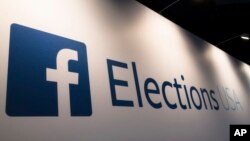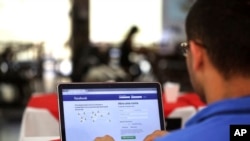Facebook founder Mark Zuckerberg has admitted the company made mistakes in dealing with the private data of its users.
In a Facebook post Wednesday, Zuckerberg apologized and said the social media service is already taking steps to prevent misuse of user data in the future.
“The good news is that the most important actions to prevent this from happening again today, we have already taken years ago,” Zuckerberg said. “But we also made mistakes, there's more to do, and we need to step up and do it.”
The apology came after news reports said a British company was able to secretly collect private information on more than 50 million Facebook users. The information was reportedly given to the company, Cambridge Analytica, by a researcher at Cambridge University named Alexksandr Kogan.
Facebook says Kogan gathered the private data in 2013 through an app that asked users a series of questions for what was described as a personality test. Zuckerberg said about 300,000 Facebook users signed up to use the app.
Kogan collected information from those users and their Facebook friends. Reports say he later shared that information with Cambridge Analytica, without the users’ approval.
The company uses a method known as “psychographs.” This uses information about a person’s behavior to influence their decisions.
Cambridge Analytica data was used during the 2016 U.S. presidential election. The company worked for then-candidate Donald Trump. However, a Trump campaign official said the campaign used Republican data sources, not Cambridge Analytica, for voter information.
Zuckerberg says the company took action in 2014 to prevent app developers from abusing Facebook users’ data. One of the main measures prevented apps from collecting data about a person’s Facebook friends unless a friend also used the app.
He said that since 2014, Facebook has required app developers to get approval from Facebook before they request any “sensitive” data from people.
When the company learned from reporters in 2015 that Kogan had shared the data with Cambridge Analytica, Zuckerberg said Facebook immediately banned Kogan’s app. It also sought confirmation from Kogan and Cambridge Analytica that all the private data had been deleted from its records.
At the time, Zuckerberg said Cambridge Analytica confirmed the deletions. But he said he learned through news reports that the deletions may not have happened. When he found this out, he said he banned the company from using any Facebook services and launched a new investigation to find out what happened.
“This was a breach of trust between Kogan, Cambridge Analytica and Facebook,” he wrote in his Facebook post. “But it was also a breach of trust between Facebook and the people who share their data with us and expect us to protect it. We need to fix that.”
Zuckerberg also spoke to the New York Times newspaper. He said he now believes Facebook clearly should have demanded more proof that the data had been deleted. Zuckerberg also told the Times that since founding Facebook in 2004, he [has] made “all kinds of different mistakes,” both technical- and business-related.
In an interview with CNN, Zuckerberg said he was sorry that Facebook users have to deal with the issue and admitted making other mistakes. Zuckerberg said he had "probably launched more products that have failed than most people will in their lifetime."
But he added that he has learned a lot from his mistakes. "That's the commitment that I try to have inside our company, and for our community."
Zuckerberg said Facebook plans to complete a full investigation into whether the data has been deleted and to identify any wrongdoing at Cambridge Analytica. He added that British officials are also looking into the company’s actions.
Several U.S. lawmakers have said they plan to call on Zuckerberg to appear in Congress to answer questions about privacy issues.
One of Facebook’s critics over data privacy is Brian Acton, the co-founder of WhatsApp. Facebook bought the company in 2014 for at least $16 billion. Acton wrote a short message on Twitter this week urging people to stop using Facebook.
“It is time. #deletefacebook,” his post said. Acton announced last year he was leaving WhatsApp to start his own foundation.
Facebook’s financial health has suffered greatly since news of the privacy issue broke. Reuters news agency says the company has lost more than $50 billion in market value since last Friday.
I’m Bryan Lynn.
Bryan Lynn wrote this story for VOA Learning English. Ashley Thompson was the editor.
We want to hear from you. Write to us in the Comments section, and visit our Facebook page.
_______________________________________________________________
Words in This Story
app – n. computer program that performs a special function
personality – n. set of emotional qualities, ways of behaving, etc., that makes a person different from other people
sensitive – adj. highly personal
delete – v. to remove (something, such as words, pictures, or computer files) from a document, recording, computer, etc.
breach – n. action that breaks a rule, agreement, or law
commitment – n. promise or firm decision to do something
foundation – n. an organization that is created and supported with money that people give in order to do something that helps society







